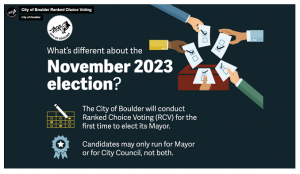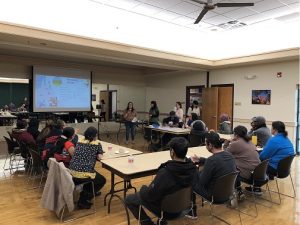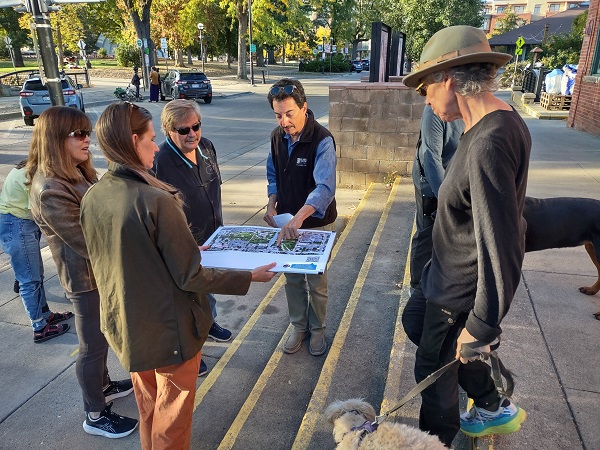2024 All-America City – Boulder, CO

Sitting at the foothills of the Rocky Mountains, Boulder’s 43,000 acres of open space and 75 miles of walking and biking paths contribute to a high quality of life for residents who enjoy the outdoors. However, high costs and local development policies designed to preserve a small-town feel and recreational amenities have contributed to an affordable housing crisis, limiting who can afford to live in Boulder.
The majority of Boulder’s population is white, highly educated, and affluent, while Boulder’s vibrant and diverse communities of color have often been left out of the narrative. To confront this issue, city staff have made a concerted effort to work with collaborating organizations over the past eight years to move away from decision-making processes and systems of power dominated by majority voices. Through a shift in the city’s culture of community engagement and a focus on an action-oriented racial equity plan, historically excluded voices are now being lifted and brought to the forefront.
Ranked Choice Voting for Boulder’s Mayor
In 2020, a group of community leaders in Boulder worked to introduce Ranked Choice Voting (RCV) to address rising political polarization and community divisions. RCV is a voting method that allows voters to rank election candidates in order of preference when there are three or more candidates. By redistributing the votes of the lowest percentage candidates to voters’ second and third choices, the system reflects voter intent without the time and expense of a run-off election.
The Our Mayor Our Choice Ballot Measure committee collaborated with community stakeholders to place the RCV measure on the ballot and achieve its passage, with 78% of voters supporting the change to decide their mayor through ranked choice voting.
With a clear mandate from the community, efforts to change the system and educate voters began. The city clerk’s office launched a communications campaign, including a voting guide, an informational web page and video, a blog post, press releases, and instructional webinars. They also provided an in-person opportunity to use a practice tool and ask questions at a citywide engagement event.

On election day, the Boulder County Elections Division provided updates on a dedicated RCV page so voters could witness the process and understand how their votes were counted.
Post-election, a survey revealed high satisfaction with the voting experience, with 77% expressing satisfaction and 86% finding it easy to fill out their ballots. Boulder’s RCV implementation received praise from FairVote for setting a gold standard for efficiency and transparency.
Community Connectors-in-Residence
 In response to the COVID-19 pandemic, Boulder expanded its Community Connector engagement model, partnering with bilingual and bicultural leaders to bridge relationships between historically excluded communities and local government. The model transitioned from project-based to ongoing teams to address emerging concerns, distribute public health information, and facilitate broad input on projects and policy decisions.
In response to the COVID-19 pandemic, Boulder expanded its Community Connector engagement model, partnering with bilingual and bicultural leaders to bridge relationships between historically excluded communities and local government. The model transitioned from project-based to ongoing teams to address emerging concerns, distribute public health information, and facilitate broad input on projects and policy decisions.
Each Community Connector-in-Residence works closely with a community they naturally lead, focusing on addressing key issues such as housing, economic opportunity, and racial equity. Over three years, these connectors have played a pivotal role in gathering feedback from their respective communities, particularly on city projects and decisions. Through tailored sessions focused on building community power and amplifying voices, they have provided invaluable insights that have influenced the city’s priorities, including the 2024 budget.
The impact of the Community Connectors-in-Residence program extends beyond feedback gathering. It has facilitated meaningful public engagement, with a notable portion of speakers at public hearings being connected to these connectors. As a result, the approved 2024 budget reflects the priorities identified by the community, with significant investments in affordable housing and health equity.
The Community Connectors-in-Residence program stands as a testament to Boulder’s commitment to inclusive governance and equitable decision-making, showcasing the transformative power of community engagement in shaping the city’s future.
The Racial Equity Instrument
The City of Boulder is deeply committed to promoting racial equity throughout its local government operations. This commitment involves striving to eliminate racial disparities and ensuring that everyone, regardless of race, can enjoy a high quality of life and access to opportunities. Key to this effort was the creation of the Racial Equity Instrument (REI), which guides the city in developing, implementing, and evaluating policies, programs, and budget decisions through a racial equity lens.
Over the past two years, the city has employed the REI on more than 20 projects, with the Equity and Belonging team and REI facilitators playing crucial roles. One notable application of the REI was in the Civic Area Historic District proposal, marking the first use of the instrument in a historic preservation project. By using the REI, staff recognized the importance of elevating the narratives of historically excluded populations and ensuring a more inclusive historical perspective.
The impact of the REI can be seen in various aspects of the project, such as the creation of a more balanced walking tour script and the development of an interactive Storymap. Through these efforts, the city aims to tell a more complete history of the area and recognize the contributions of marginalized communities.

Looking ahead, Boulder aims to integrate the lessons learned from this initiative into forthcoming projects, including the revision of historic designation guidelines. These ongoing endeavors underscore Boulder’s continuing commitment to fostering racial equity and inclusivity in governance and historical conservation efforts.
Some Related Posts
Thank You to Our Key Partners



